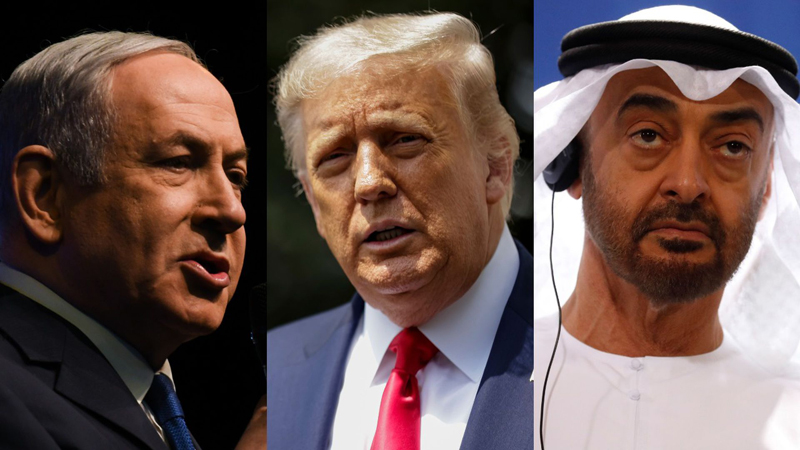“In international relations, there are no permanent friends or permanent enemies, only permanent interests.”
(John Henry Temple)
Iran-Saudi Arabia conflict is a political and economic struggle exacerbated by sectarian and racial differences for influence, authority and power in the Middle East and the surrounding region. The two countries continue providing a varying degree of support to dissenting neighbouring conflicts. The rivalry extends to a fluctuating dispute in Yemen, Bahrain, Lebanon, Qatar, Afghanistan, Nigeria and Morocco, as well as broader competition in North and East Africa, parts of South Asia, Central Asia and the Caucasus. The conflict is waged on multiple levels over geopolitical, economic and sectarian influences in pursuit of regional hegemony.
American support for Saudi Arabia and its allies versus Russian and Chinese support for Iran and its allies have drawn many comparisons to the dynamics of the Cold War regime.
The dispute, aggravated by religious differences and sectarianism, are exploited by vested interests to strengthen the respective regime’s goals and objectives. The monarchies, particularly Iran, since the US-led coup in 1953, were allied with the US to ensure stability in the Gulf region and acted as a bulwark against Soviet influence during the Cold War. The current Iran-Saudi proxy conflict can be traced back to the Iranian Revolution of 1979 when the US-backed monarchic Imperial state of Iran became an Islamic republic. The revolutionaries of Iran called for an overthrow of the kingdoms and secular governments and be replaced with Islamic republics in the Middle East and North Africa. Accordingly, Saudi Arabia and her close gulf allies sought protection in American lap.
Pakistan relation with Saudi Arabia has been historically strong. It is one of the key allies and Pakistan banks heavily on oil imports and the workforce employed in Saudi Arabia. Pakistan has continuously endeavoured to mediate between Saudi Arabia and Iran but avoided being unnecessarily dragged into the conflict. However, Pakistan has fallen into sectarian dissonance due to a growing struggle by Iran and Saudi Arabia for spreading respective influence since 1979. Pakistan often fears that Iran is trying to recruit its large Shiite population to serve Iran’s vested interests. Pakistan’s links with Iran were occasionally marred with several other problems, not just Shia issue, but the ongoing conflict in Afghanistan. Iran-backed proxies continue struggling against Pakistan and its ally, Taliban; further strengthening Pakistan-Saudi bilateral relations. Nevertheless, Pakistan has continued abstaining from disapproving Iran, but rather it seeks to preserve the relations given to historical linkage.

Saudi Arabia conventionally pursued closer ties with Pakistan as part of its “look east” policy of expanding its reach to East and South Asia in 2016. In February 2018, Saudi Arabia, acting on behalf of the GCC, joined China and Turkey in opposing a US-led initiative to place Pakistan on an international terror-financing watch list through the Financial Action Task Force.
On the contrary, Saudi Arabia turned down Pakistan’s repeated requests to convene a special OIC meeting on Kashmir.
There have been murmurs of discontent in Islamabad over Saudi Arabia; not taking a pro-Pakistan stance on Kashmir.
Another visible indication that ties are weakening when stories appeared that Saudi Arabia has asked to pay back the US $1 billion; turning the oil tap off to be delivered on deferred payments.
There are several reasons for souring relations. Saudis have their laundry list of complaints with Islamabad too. is not happy with Pakistan’s fraternising with countries rivals to her leadership of the Muslim world.
Another important reason to crack the whip on Pakistan is her strengthening economic and security relationship with India over the past decade; therefore, avoiding raising the Kashmir issue at OIC forum. But, it is expected that both major players in the Islamic world with a history of close ties, would find ways and means to manage the differences.
Let us now trace back “Middle East Peace Process,” supervised by the US since 1978. There have been parallel efforts to find terms and conditions upon which peace can be agreed to in the Arab-Israeli and Palestinian-Israeli conflicts.
A few countries have signed peace treaties, such as Egypt-Israel (1979) and Jordan-Israel (1994), whereas others have not yet found a mutual basis to do so.
Factually, Palestinians have been a constant gradual looser participant on terms and conditions offered by succeeding parleys beginning with Camp David Accord of September 17, 1978, through to “new peace initiative for an Israeli-Palestinian deal” by President Donald Trump in early 2018.
Every succeeding dialogue and conference on “Middle East Peace Process” reduced the value of Israeli offer to Palestinians. Libyan Leader Qaddafi is on record; pointing out that Arab rulers are gradually selling of Palestinian blood for prolonging respective despotic regimes.
Is Israel an American colony?
The assertion is that the White House in Washington is Jewish-occupied territory and Israel is one of the states of the US.
There is no harm in recognising Israel that behaves like a peaceful and responsible member of the comity of nations. But that Israel does not exist
Although Israel is not, in reality, a protectorate of the US, one cannot ignore the tremendous influence that Israel has on American policies and strategies related to the Middle East. The US’s foreign policy linked to the Middle East and North African regions has always been Israel specific, hence, gradually improving her domination in the Middle East region after Gulf War-I (1991).
Later, the epoch of 9/11, leading to Gulf War 2, during the year 2002, had completely offered space to Israel’s further hegemony.
Nevertheless, Israel is one of the distinctive countries in the prevailing world order; maintaining a balanced and calculated diplomatic and commerce relations with most of the significant global powers, for example, China, UK, Japan, Soviet Union, India and Brazil etc.
The United Arab Emirates stunned the world by announcing ‘full normalisation of relations’ with Israel under a US-brokered deal. This would make the UAE the third Arab state to recognise Israel, after Egypt and Jordan. The move is strongly touted by the signatories and many of their allies as a great leap forward. The deal is sold as an agreement reached to stop further Israeli annexation of Palestinian territories. But the actual agreement only uses the word “suspend,” thereby, meaning that Israel will suspend declaring sovereignty over parts of the West Bank. The entire document gives nothing to Palestine. Not even an assurance to continue talks.
The truth is that several Arab states have already established strong ties with Israel for having Iran as a common adversary. We also know that these countries could not care less for oppressed Muslim brothers, be they Palestinian, Kashmiri, or Rohingya.
A fair-minded assessment of prevalent political and geo-strategic circumstances by a rational thinker easily tipoffs to one conclusion: the countries and nations governed by monarchs and dictators of the Middle East have turned into virtual colonies of the US in the larger interest of Israel to prolong respective dictatorial regime after Gulf War-2.
Well, there is no harm in recognising Israel that behaves like a peaceful and responsible member of the comity of nations. But that Israel does not exist.
Pakistan’s geographical location is an asset as well as a liability, hinging on complex economic, social, military and political dynamics. It is a medium-sized regional power in South Asia possessing seventh-largest conventional military force; ranking sixth in population and the only nuclear-weapon state in the Muslim world. Pakistan is sometimes referred to as a “crisis state,” which has been beset with unrelenting challenges, but has largely been resilient and succeeded in navigating through trying phases.
Pakistan’s foreign policy strongly advocated “no diplomatic recognition of Israel” since 1948, which was intensely supported by common folk; disregarding merits and demerits. Israel has strong diplomatic and economic ties with India but it never opposed Pakistan blatantly, except a few fictions and narratives based on conspiracy theories by the fanatics and extremists. Is it not the right time to reevaluate Pakistan’s diplomatic position about Israel?
Pakistan’s foreign policy is following the theme “remain relevant to the US” for the last 70 years. The question is “Is it the right time to switch over to another notion?”
The answer is a big “NO.”
The geographical situation mingled with the prevailing financial health of Pakistan doesn’t provide leverage to sustain stable relations with rivalling nations of the US. The recent arm-twisting of Pakistan by the Saudi monarch is the case in point. Pakistan has been a closer partner and associate to Saudi Arabia. The switch over to neutrality will be an uphill task.
The writer is a retired Pakistan army officer
